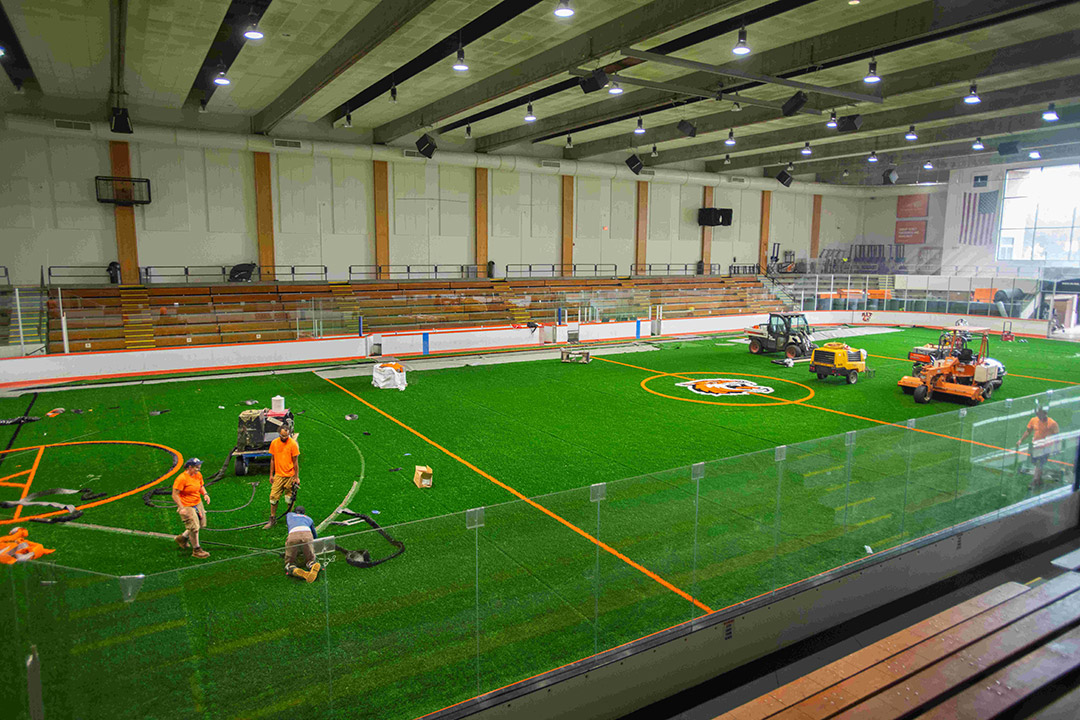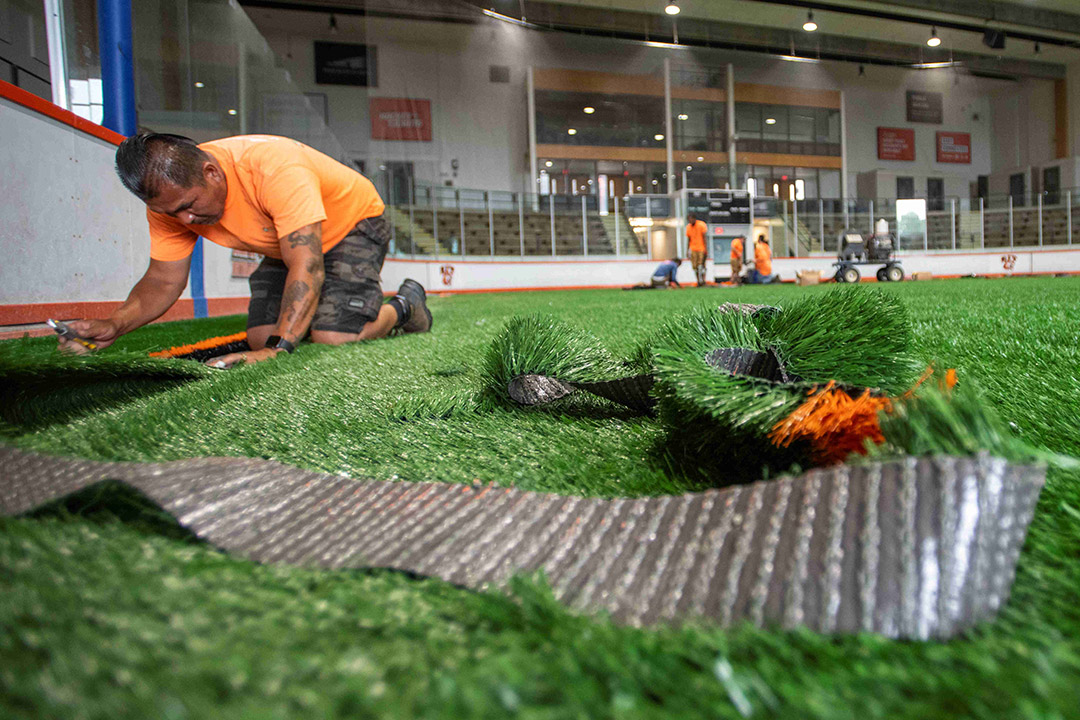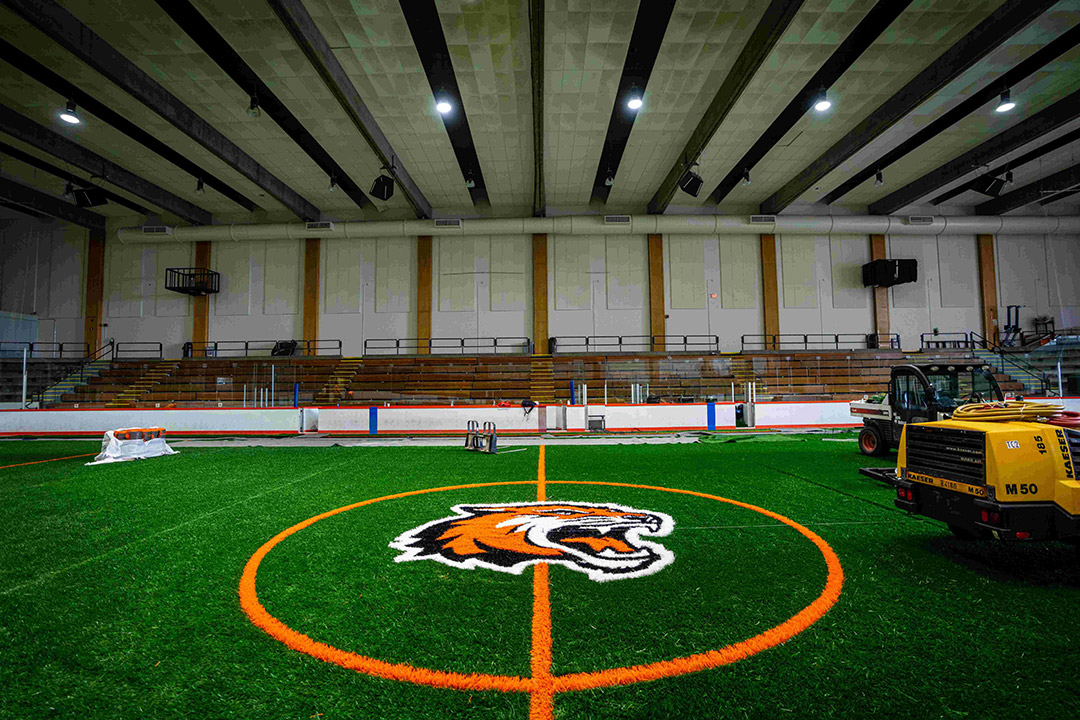Frank Ritter Arena gets new life as an indoor turf arena
Decades of memories of early RIT hockey remain
Travis LaCoss/RIT
Ritter Arena, formerly an ice rink, has been transformed into an athletic training arena, complete with a turf floor.
For decades, Ritter Arena was a hockey ice arena, where countless games, practices and recreational skating opportunities awaited the RIT community. Dedicated in 1968 when RIT opened its Henrietta campus, the building hosted five NCAA Championships, most recently, the women’s Division III final in 2011.
Since the 4,000-seat Gene Polisseni Center opened in 2014, men and women’s hockey practices and games have moved there. Ritter served as a temporary housing area for Wallace Library materials during the construction of the SHED, as well as offering recreational and study areas for students during the pandemic.
This summer, Ritter had synthetic turf installed on its floor and has been transformed into a new space for athletics. It will also be used to host university functions, Wellness classes, practices, and recreational activities, and be available for rent from outside interests.
Travis LaCoss/RIT
This summer, Ritter had synthetic turf installed on its floor.
“The arena will serve as the primary indoor venue for RIT Athletics and intramural and club sports during cold and inclement weather and special events,” said Jackie Nicholson, executive director for Intercollegiate Athletics.
“With the addition of a turf field surface in Ritter Arena, the university will be able to address a pressing facility need, while simultaneously taking a step that could bolster its athletic programs and enhance the offerings provided through recreation,” she said. “This will allow not only student athletes access to an indoor turf facility, but also all RIT students who participate in either or both intramural and club sports.”
Nicholson said the men’s and women’s rowing teams will also use Ritter as an indoor training facility, allowing members to permanently store their ergometer equipment in a location that is accessible to them all year.
“Our strength and conditioning department will also see a great benefit to this facility as this would provide an enhanced functional movement training facility that we currently do not have the space for,” Nicholson said.
Ritter’s transformation brings back memories from alumni, who faithfully attended hockey games at the old arena, which had limited bathroom facilities and dining options.
Travis LaCoss/RIT
For decades, the arena was filled with fans during RIT men’s and women’s hockey games. Hockey games are now held in the Gene Polisseni Center.
“Ritter will always have a place in the hearts of longtime RIT hockey fans, but most of us will not miss the lack of food options, potentially losing your seat if you got up from it, the lack of restrooms, and the lack of a lobby,” said Henrietta Supervisor Stephen Schultz, ’07 (computer science). “I would have preferred the rink stay a rink, but if it can't do that, then seeing it be used for other sports is far more preferable than seeing it demolished.”
Schultz, who helped create the modern Corner Crew hockey fan club, said Ritter offered RIT players a big home-ice advantage.
“The fans were right on top of the action. The home bench was next to the penalty boxes, meaning when a penalty expired, the Tiger player could just hop to the bench, whereas the opposing player had to cross the width of the ice to get to their bench.”
Schultz said the Corner Crew added music to the hockey games in Ritter, first with a keyboardist and later he served as a disc jockey. A donated amplifier was raised into the crow’s nest every season using a rope and tackle.
“It became such an integral part of the game, the rink upgraded the sound system and took over the music,” he said.
David “Big Goon” Faas has been a member of Corner Crew since 1989. He recalls the first hockey games he attended were two championship games in Ritter in the late 1980s.
“The atmosphere in Ritter was electric,” Faas said. “Those were the first of countless memories I have from Ritter.”
He still faithfully attends RIT hockey games, now in the Polisseni Center. “It’s a great arena, with all the great amenities the players and fans deserve,” Faas said. “Though I am sad that Ritter will never have ice again, I am happy that it will be used to help future Tiger athletes be the best they can be. And Ritter will always have a place in my heart.”








